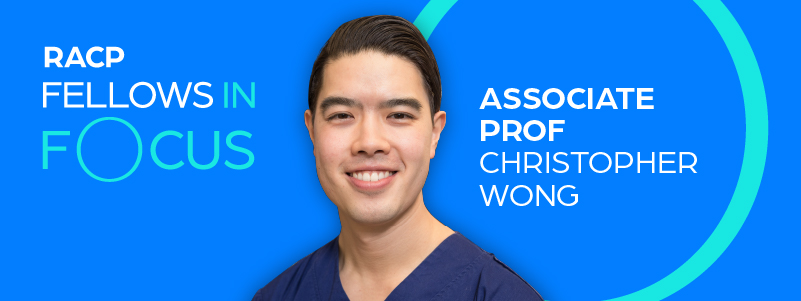RACP Fellows in Focus: Associate Professor Christopher Wong
Date published:
02 Nov 2021

Associate Professor Christopher Wong is a clinical and academic cardiologist with interests in cardiovascular medicine, heart rhythm disorders and public health.
Chris studied medicine at the University of Adelaide, where he was an elected member of the University Council and was awarded a Rhodes Scholarship. He read for a masters degrees in clinical trials, epidemiology and population health at Oxford University, and subsequently completed a PhD in cardiovascular medicine. He is now doing furthering study and training at Harvard University and the University of California San Francisco after being awarded a Fulbright Scholarship.
Chris’ current list of achievements and appointment is extensive, to say the least. He’s a Consultant Cardiologist at the Cardiovascular Centre, an Electrophysiology Fellow at the Royal Adelaide Hospital, and an Associate Professor of Medicine at the University of Adelaide. Furthermore, he’s a Fellow of the American College of Cardiology, the European Society of Cardiology and an Internationally Certified Cardiac Device Specialist. His list of peer-reviewed publications now exceeds 200. This, of course, is only scratching the surface.
“I chose cardiology for a number of reasons”, Chris told us. “The first of which is that cardiovascular disease is very common and important. I felt I could help, not only the patients I see every day, but also many other people, through research and public health efforts. I hope in this way I can make a meaningful contribution to wider society. The second aspect is that cardiology is a field that has so many different dimensions, which makes it really interesting on a day-to-day basis. I can see patients in the clinic, I can see patients in the hospital, I can do various investigations, I can perform procedures, I can work public, and I can work private. After experiencing cardiology for myself as a student, I felt it was a very easy choice for me in the end.”
"Most of my research has been on heart rhythm disorders, in particular, an irregular heartbeat called atrial fibrillation, or AF for short. Unfortunately, we are increasingly realising that it can be a serious condition, despite it being very common. One in four people throughout life will develop it at some stage. It not only causes troubling symptoms like palpitations, shortness of breath, and dizzy spells, but it can also lead to serious complications such as strokes, heart failure, and premature death."
“A few years ago, my research highlighted that AF is a bigger problem than we previously thought. In Australia, it is now the top reason to be hospitalised for a heart condition, far exceeding those for heart attacks and heart failure, which are more commonly recognised by the general public. I've gone on to show that AF not only causes complications like stroke and heart failure, which had been well known for a long time, but it also causes previously under-recognised complications such as dementia, worsening of kidney disease, and sudden stopping of the heart that can lead to death. I'm proud of the work we've done and we're also doing lots of research in management approaches and treatments to help them try and improve things even further."
Chris touched upon lots of extremely challenging moments and enormous rewarding opportunities that he’s come across or embraced during his training and his career. However, he revealed that there was one that really stuck in his mind. He explained, “One of the biggest opportunities I had was part-way through my physician training when I was invited to extend not only my clinical training but also my research skills. This was at the University of Oxford in the United Kingdom, with the support of a Rhodes Scholarship. Due to the specific timeframe required, it was a difficult decision to make as it meant continuing physician training overseas, and leaving his family and wife, to move to United Kingdom. That was personally challenging, but it was a fantastic experience living in Oxford for two and a half years. I matured as a doctor working in a different healthcare system, and learnt a range of new research skills which I continue to use every day. That experience definitely shaped the doctor and researcher that I am today.”
And for anyone considering following in the same footsteps as Chris, he offered some sage advice, “Research is something that every doctor should experience. It is such a critical part of medicine and as a result it behooves us as doctors to try it for at least a short period of time to better understand how we can interpret the utility and limitations of research and best treat our patients. It is understandable that not every doctor will continue to participate personally in research, and it's definitely an endeavour of highs, lows, and hard work. However, it is certainly very rewarding and everyone should try it out. And hopefully, if they like it just as much as I have, they'll continue to enjoy it, for the challenges and the rewards to our patients it brings.”